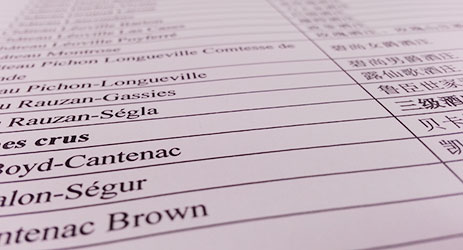China’s government is seeking to reduce confusion for consumers by standardising translations of key wine terms.

A draft of the Norm of Terminology Translation of Imported Wines has successfully passed examination in a consultation meeting in Beijing.
The meeting was organised by China Chamber of Commerce of Foodstuffs and Native Produce, one of the drafting bodies of the regulation. Representatives present at the meeting included experts from Ministry of Commerce and General Administration of Quality Supervision, Inspection and Quarantine, as well as wine industry professionals from importers and distributors such as C&D Wine, ASC Fine Wines, Pernod Ricard and LVMH.
Currently, it is possible to have several different translations of the same wine region or grape variety on the market at once.
‘The lack of standard translation causes unnecessary complications in terms of increasing public knowledge and promoting imported wines,’ Professor Li Hua, a primary drafter from College of Enology, Northwest A&F University told DecanterChina.com. ‘It also provides opportunities for forged wines.’
With the support from trade bodies in major winemaking countries and several importers and distributors in China, the draft regulation proposes standard translations of thousands of wine terms, from major grape varieties to principal wine regions and estates, such as Cabernet Sauvignon, Margaret River, Opus One Winery to name only a few.
The document is expected to raise awareness of imported wines among Chinese consumers, and to help protect them from being misled. As a recommended industrial regulation, using the standard translation on wine labels may also shorten the customs clearance time.
‘This initiative shows the government’s effort to better regulate the imported wine market. This is a very good sign,’ said Dorian Tang, national manager of wine education at ASC Fine Wines, who attended the consultation meeting.
‘Standard translation of wine terminology will improve consumer experience of purchasing imported wines and make it easier for Chinese consumers to learn about wine. This will help the development of the wine market in China.’
After being amended according to the comments and suggestions from the consultation meeting, the document will be submitted to the Ministry of Commerce for final approval.
All rights reserved by Future plc. No part of this publication may be reproduced, distributed or transmitted in any form or by any means without the prior written permission of Decanter.
Only Official Media Partners (see About us) of DecanterChina.com may republish part of the content from the site without prior permission under strict Terms & Conditions. Contact china@decanter.com to learn about how to become an Official Media Partner of DecanterChina.com.

Comments
Submit